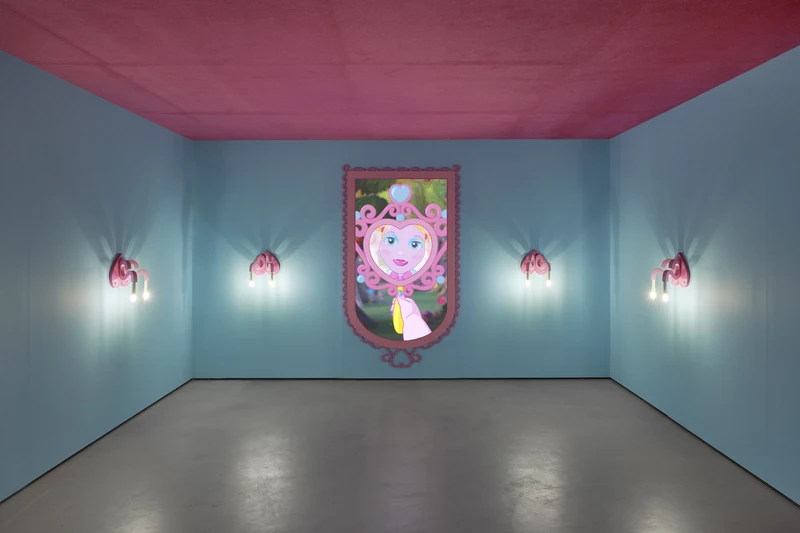Rachel Maclean: That's not Mi!
25 Nov 2021-22 Jan 2022


Over the past decade, Maclean’s celebrated works of incisive commentary on modern life cloaked in costume and graphic skins have travelled the world, from the National Gallery and Tate in London to the Venice Biennale, where she was the 2017 representative for Scotland.
That’s not Mi! is an unprecedented intervention of the 40-46 Riding House Street galleries and the climax of the Mimi project; upside mimi ᴉɯᴉɯ uʍop - the artists first fully animated film, debuted at Jupiter Artland in May 2021 before being recently screened at the London Film Festival in October 2021.
upside mimi ᴉɯᴉɯ uʍop is a fairy tale: it has an apple-cheeked child, and a wizened crone. It has a test, challenging the protagonist as it escalates, and it has a dramatic conclusion. Mimi, a babe, is lost in the woods. “Maybe you can save Mi,” she says to the hand-mirror lying on the grass. But the mirror, like every fairy-tale antagonist, does more harm than good. It isolates her as it defines her, bullies her and tricks her, and most of all divides her in two.
Maclean mirrors and inverts throughout the exhibition, employing technology and fabrication to hit repeated notes of uneasy, uncanny perfection in a seamless, sometimes seemingly virtual space in which the viewer is implicated. Gravity pulls both ways, with each work partnered to an inverted double, perpetually upending to reveal new forms and faces- a neat shorthand for the mysterious lack of an anchoring horizon in digitally mediated life. Woven tapestries mix traditional blending of colours in an almost painterly fashion with disconcerting synthetic fibres, short-circuiting a traditional process by both modernising it and undermining it. Paintings and sculptures of the two Mimis seem flawless and endlessly repeatable, a levelling into homogeneity via digital painting and 3D printing that highlights the creepy effacement of individuality brought about by screens, our modern mirrors.
The paintings aren’t, however, infinitely repeatable. There is a hand on top of the digitally printed brushstrokes, embellishing the mechanical, quietly insisting upon the individuality of highlights and the tenacity of imperfection, a new narcissism of small differences that represents freedom from the forces — social, pharmaceutical, technological — compelling women to be more critical of themselves.